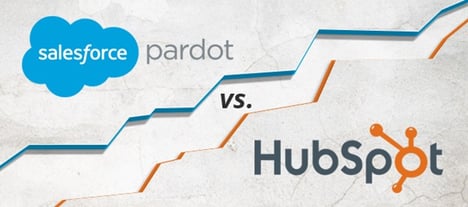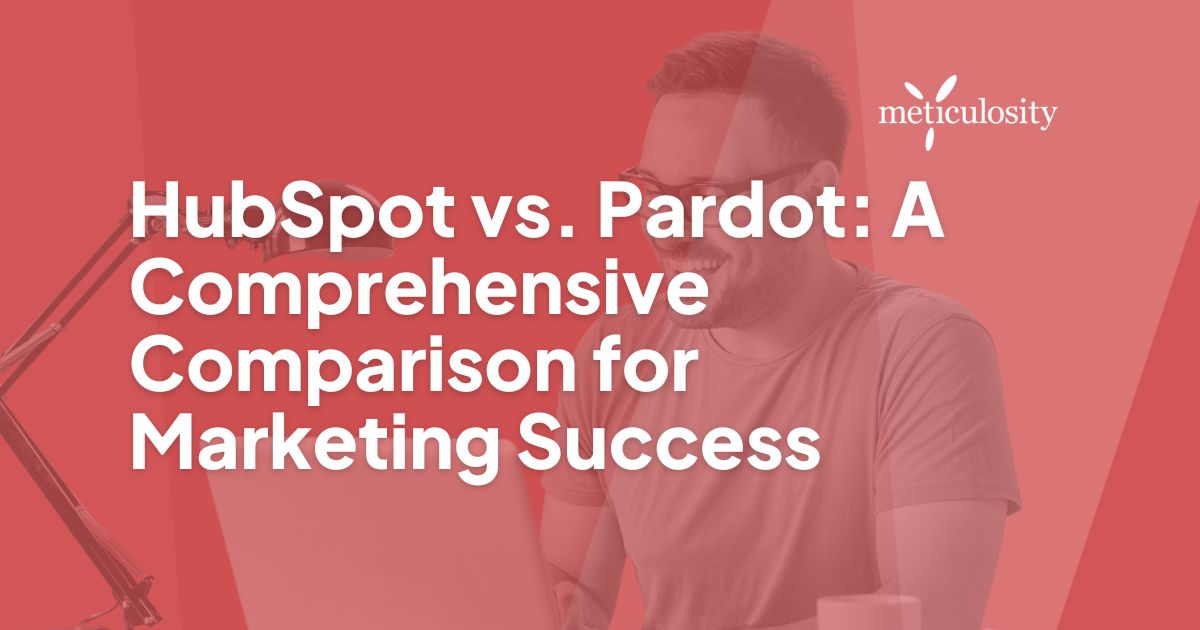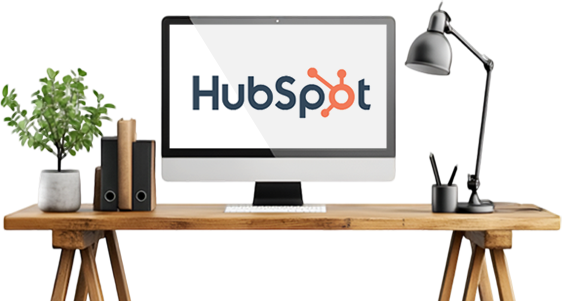Deciding between HubSpot and Pardot for your marketing automation can feel like navigating through an endless maze. You're juggling features, pricing packages, and system integrations as you pinpoint the perfect choice for your business needs.
This blog sheds light on the path by delivering an exhaustive comparison of these two industry titans drawn from extensive hands-on experience and rigorous research.
Key Takeaways
- HubSpot and Pardot are popular marketing automation platforms with different key features, pricing structures, and target audiences.
- HubSpot focuses more on inbound marketing and offers a wide range of tools for lead generation, content creation, and social media marketing.
- Pardot excels in sales enablement, providing advanced lead scoring and nurturing capabilities for B2B companies.
- When deciding between the two platforms, consider your specific marketing needs, budget constraints, and target audience to make an informed choice.
Understanding HubSpot and Pardot
HubSpot and Pardot are popular marketing automation platforms but differ in their key features, pricing structures, and target audiences.
Key Features
When comparing HubSpot and Pardot, examining their key features is imperative. These elements are crucial in deciding which platform holds the most potential for your marketing needs.
|
Features |
HubSpot |
Pardot |
|
Email Marketing |
HubSpot offers robust email marketing tools with easy drag-and-drop features, allowing personalized and automated emails. |
Pardot also offers email marketing but lacks the intuitive drag-and-drop feature. However, it provides advanced scheduling options. |
|
CRM Integration |
HubSpot comes with its own CRM, seamlessly integrating with other popular CRM platforms. |
Pardot is specifically designed to work with Salesforce CRM, offering deep integration with the platform. |
|
Content Creation and SEO |
HubSpot provides tools for blog and content creation with built-in SEO recommendations. |
In Pardot, there's more focus on the SEO side and less on content creation tools. |
|
Social Media Marketing |
HubSpot offers a complete suite of social media tools, including scheduling, monitoring, and analytics. |
Pardot does offer social media posting and profiling, but it’s not as comprehensive as HubSpot's. |
|
Analytics and Reporting |
HubSpot's comprehensive analytics tools allow for detailed reporting on various marketing metrics. |
Pardot provides strong analytics features, especially in tracking and reporting on email campaigns and customer behavior. |
|
Lead Management |
HubSpot excels with a robust suite of lead management tools, offering excellent lead nurturing and segmentation capabilities. |
Pardot also provides solid lead management features but focuses more on lead scoring and grading. |
Reviewing these key features lets you determine which platform best aligns with your marketing strategies and goals.
Pricing
HubSpot and Pardot offer varying pricing models to fit different business needs and budgets.
|
Product |
Basic Plan |
Pro Plan |
Enterprise Plan |
|
HubSpot |
$50/month |
$800/month |
$3,200/month |
|
Pardot |
$1,250/month |
$2,500/month |
$4,000/month |
HubSpot begins with a basic plan at $50 per month, suitable for small businesses or startups. Its Pro and Enterprise plans offer more advanced features, priced at $800 and $3,200 monthly.
On the other hand, Pardot's pricing model is tailored more toward midsize to large businesses. Its basic plan starts at $1,250 monthly, with higher tiers at $2,500 and $4,000 monthly for more advanced offerings.
Target Audience
Both HubSpot and Pardot are great tools for people who work in marketing or businesses. These platforms can help many different users, big and small. It doesn't matter if you sell shoes or software — these tools have something for you! They make it easier to talk to your customers and potential customers.
It's key to pick the one that fits your needs best. For many folks, this could be HubSpot because it is user-friendly. But some might like Pardot more for its advanced features.
Looking to optimize HubSpot for your business? Learn how to improve here.
Inbound Marketing vs Sales Enablement
As a marketer or business professional, understanding the main difference between inbound marketing and sales enablement is key in choosing between HubSpot and Pardot.
|
HubSpot |
Pardot |
|
|
Inbound Marketing |
HubSpot excels in inbound marketing. It provides all the tools to create and manage successful inbound marketing campaigns. With HubSpot, you can quickly generate leads through content marketing, social media, and SEO. |
While Pardot does offer features for inbound marketing, it's not its primary focus. It's geared toward B2B companies seeking advanced lead scoring and nurturing capabilities. |
|
Sales Enablement |
HubSpot also has strong sales enablement capabilities. It offers a range of features for sales teams, including email tracking, meeting scheduling, and deal pipeline management. Plus, it integrates seamlessly with the HubSpot CRM, making it easy to keep track of all customer interactions. |
Pardot shines in sales enablement. It's designed to help sales teams identify their best leads, automate follow-ups, and close deals faster. Pardot integrates seamlessly with Salesforce, providing a comprehensive view of customer interactions. |
So, when deciding between HubSpot and Pardot, consider whether your main goal is inbound marketing or sales enablement, and choose the tool that best aligns with that goal.
Lead Scoring and Predictive Lead Scoring
Lead scoring is a crucial aspect of any marketing strategy. It helps businesses identify and prioritize leads based on their likelihood of converting into customers. HubSpot and Pardot both offer lead-scoring capabilities, but there are some key differences between the two.
HubSpot provides a user-friendly interface for setting up lead scoring criteria. You can assign points to leads based on their demographics, behavior, and engagement with your content.
This allows you to identify hot leads most likely to make a purchase easily.
On the other hand, Pardot offers predictive lead scoring, which takes things a step further by using machine learning algorithms to analyze historical data and predict future outcomes.
This enables you to prioritize leads based on their current behavior and anticipate their future actions.
Both platforms provide valuable insights into your leads' activities and behaviors. Still, Pardot's predictive lead-scoring feature gives you an added advantage in targeting the right prospects at the right time.
So, if you're looking for more advanced lead-scoring capabilities, Pardot might be the better choice for your business.
Integrations with Third-Party Platforms
Integrating your marketing software with other platforms is crucial for maximizing its effectiveness. Here are some key points to consider when comparing HubSpot and Pardot in terms of integrations:
HubSpot:- Offers a wide range of integrations with popular platforms such as Salesforce, WordPress, Shopify, and more.
- Provides seamless synchronization between your CRM, email marketing tools, social media platforms, and other systems.
- Allows you to connect with third-party apps through its App Marketplace, offering additional functionality and flexibility.
- Offers integrations with various platforms like Salesforce, Google Analytics, GoToWebinar, and many others.
- Enables smooth data transfer between your CRM and marketing automation tools for a unified view of your leads.
- Provides a user-friendly integration setup process that doesn't require extensive technical knowledge.

Examining Marketing and Sales Needs
Examining your marketing and sales needs is crucial to make an informed decision between HubSpot and Pardot. Consider your required features for effective lead generation, nurturing, and conversion.
Evaluate whether the platform offers tools for creating landing pages, email campaigns, and workflows that align with your marketing objectives. Additionally, assess if it provides comprehensive analytics and reporting capabilities to track campaign performance and measure ROI.
On the sales side, determine if the platform offers CRM integration, lead-scoring functionalities, and automation tools to streamline your sales processes. You can choose a platform that best suits your business goals by thoroughly examining your specific marketing and sales requirements.
Considering Budget Constraints
When considering budget constraints, it is important to assess the costs of both HubSpot and Pardot. HubSpot offers various pricing tiers based on the features and services needed, making it suitable for businesses with different budgets.
Pardot's pricing structure follows a similar approach, offering different plans depending on the level of functionality required.
In addition to upfront costs, it is crucial to consider long-term expenses such as training, support, and maintenance fees. Both platforms provide customer support options that can help users navigate any challenges.
Ultimately, evaluating your budget constraints will help determine which marketing automation platform aligns better with your financial resources while meeting your business needs.
Analyzing Target Audience
Analyzing your target audience is crucial when deciding between HubSpot and Pardot for your marketing needs. Understanding your audience will help you determine which platform would be the best fit for reaching them effectively.
To analyze your target audience, consider their demographics, such as age, gender, location, and interests. This information will give you insights into the type of content and messaging that resonates with them.
Next, think about their behavior online. Are they active on social media? Do they prefer email communication, or do they interact more on websites? Knowing how your audience engages with digital channels will help you select a platform that caters to their preferences.
Additionally, it's important to consider your target audience's purchase journey. Are they just starting their research, or are they ready to make a buying decision? Understanding where they are in the sales funnel will assist in determining which platform can support lead nurturing and conversion.
By thoroughly analyzing your target audience, you'll understand whether HubSpot or Pardot aligns better with reaching and engaging them successfully.
Making the Final Decision
When it comes to making the final decision between HubSpot and Pardot, it's important to carefully consider the pros and cons of each platform while also taking into account additional factors such as your specific marketing and sales needs, budget constraints, and target audience.
Pros and Cons
When comparing HubSpot and Pardot, it's important to consider the pros and cons of each platform. HubSpot offers a user-friendly interface, making it easy for marketers to create and manage campaigns. It also provides powerful analytics and reporting features, allowing businesses to track their marketing efforts effectively. However, it may be more expensive than Pardot, especially for small businesses with limited budgets. On the other hand, Pardot is known for its scalability and integration capabilities with Salesforce CRM. It also offers robust lead scoring and automation features that help streamline sales processes. However, some users find its reporting capabilities less advanced compared to HubSpot. Ultimately, the choice between HubSpot and Pardot depends on your specific marketing needs, budget constraints, and target audience requirements.
Additional Factors to Consider
Here are some additional factors to consider when deciding between HubSpot and Pardot:
- Scalability: Consider your company's growth plans and whether the marketing automation platform can scale accordingly.
- Customization: Consider how much flexibility you need in customizing your marketing campaigns and workflows.
- Integration capabilities: Evaluate how well the platform integrates with other tools and software that you currently use or plan to use.
- Reporting and analytics: Look for robust reporting features that provide insights into your marketing efforts and help measure ROI.
- Training and support: Assess each platform's level of training and support, as it can significantly impact your team's ability to utilize the software effectively.
- User interface: Consider how user-friendly and intuitive the platform is, as this can affect adoption rates among your team members.
- Templates and resources: Look at each platform's templates, resources, and educational materials to assist with your marketing efforts.
- Data security: Ensure the platform has strong measures to protect sensitive customer information.
- Community and user network: Explore whether there is an active community or user network associated with each platform, as this can provide valuable insights, tips, and best practices.
- Reputation and reviews: Read reviews from other marketers or business professionals who have used either HubSpot or Pardot to get a sense of their experiences with each platform.

Conclusion
After examining the key features, pricing, and target audience of HubSpot and Pardot, it is clear that both platforms have their strengths and weaknesses. When deciding between the two, it's important to consider factors such as inbound marketing vs sales enablement, lead scoring capabilities, integrations with third-party platforms, and analyzing your marketing and sales needs.
Ultimately, the choice will depend on your specific budget constraints and target audience. So take your time to carefully evaluate each platform before making a final decision for marketing success!
Click here to learn more about HubSpot marketing.
FAQs
1. What are the key differences between HubSpot and Pardot, and how do I decide which is better for my business?
HubSpot and Pardot are both powerful marketing automation platforms, but they have different strengths. HubSpot is an all-in-one platform that integrates marketing, sales, and customer service tools, providing a unified solution for businesses of all sizes. Pardot, by Salesforce, is known for its robust B2B marketing automation features, offering advanced lead nurturing and scoring capabilities. The choice between them depends on your business needs; HubSpot for a comprehensive, integrated solution, and Pardot for advanced B2B marketing automation within the Salesforce ecosystem.
2. Is there a significant difference in pricing between HubSpot and Pardot?
Yes, there is a difference in pricing between HubSpot and Pardot. HubSpot typically offers a more transparent pricing model with various tiers, including a free plan, making it more accessible for businesses of different sizes. Pardot's pricing may be higher, especially for advanced features, and is often tailored based on the specific needs and scale of the business. It's recommended to compare the pricing structures of both platforms based on your business requirements and budget.
3. How do HubSpot and Pardot compare user-friendliness and ease of implementation?
-
HubSpot: Known for its user-friendly interface, HubSpot is often praised for its ease of use and quick implementation. The platform is designed to cater to users with varying levels of technical expertise.
-
Pardot: While Pardot is robust, some users find it to have a steeper learning curve due to its advanced features. However, its integration with Salesforce can benefit businesses already using Salesforce products.
Choosing between them in terms of user-friendliness may depend on your team's familiarity with the platform and your preference for a more comprehensive but potentially complex system (Pardot) versus a user-friendly, all-in-one solution (HubSpot).
4. Can my business use HubSpot and Pardot to integrate with other tools and systems?
HubSpot and Pardot are designed to integrate with various third-party tools and systems. HubSpot offers various integrations through its App Marketplace, connecting with CRM systems, analytics tools, email platforms, and more. Pardot, being part of the Salesforce ecosystem, seamlessly integrates with Salesforce CRM and other Salesforce products. When evaluating either platform, consider your existing tech stack and ensure the necessary integrations are available to support your business processes.







